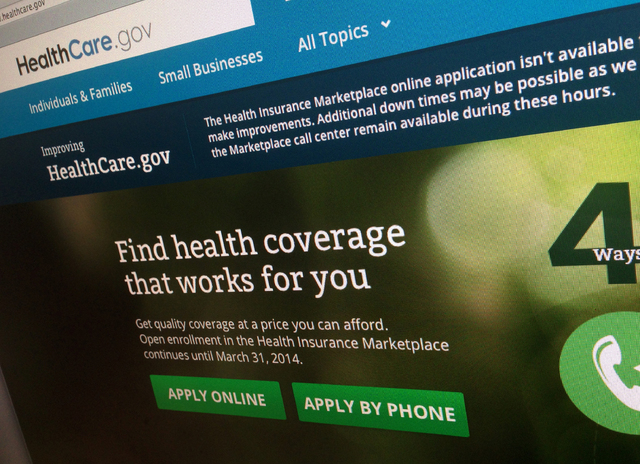Sign-up deadline passes; vexation doesn’t
Nevada Health Link’s open enrollment ended March 31, but the stream of questions into our email inbox continues unabated.
Some consumers still report problems ironing out what coverage they have, while others want to know if they can find ways around restrictions on signing up outside open enrollment.
First up is a consumer who has what’s become a routine coverage problem.
■ Las Vegan Karina Jett emailed us for help with “roadblocks” she’s hitting trying to iron out her exchange policy’s effective date.
Jett, a professional poker player and real estate agent, paid about $850 in premiums on Jan. 20 for a policy that Nevada Health Link customer-service reps told her would take effect March 1. But when Jett got her insurance cards at the end of February, the effective date was listed as Jan. 1.
That’s a problem because the exchange applied her Jan. 20 payment to January coverage that Jett didn’t want or have at the time. Now, the system is telling her she owes a payment for February and March, even though she didn’t have coverage in February and she made her March payment in January. She also owes for April, for a grand total of more than $2,300.
“I can’t afford to pay for all three months. Health care is extremely expensive for us,” said Jett, a mother of three whose husband, Chip, works for an online gaming company. “But we’re basically independent contractors, so we need this more than anything. You have three kids, you need insurance.”
Jett said she hasn’t gotten anywhere calling the exchange. Her carrier, Health Plan of Nevada, tells her they can’t help her because the exchange has to fix its own mistakes. When Jett had a tooth infection in March, she didn’t even bother to get care.
“I was scared. What if they don’t pay this? I will have to pay out of pocket, and I can’t afford that. Right now, I don’t even have insurance. I can’t use it. And I’m not going to pay it (the additional premiums). I refuse,” she said.
To help Jett, we called Tamar Burch of Las Vegas insurance brokerage Branch Benefits Consultants. Burch has a long list of clients with similar effective-date issues.
The problem, Burch said, is a website glitch in which the portal takes a “picture” of when the application originally got created. For Jett, that was in the fall, before the first sign-up deadline on Dec. 23. That would explain the Jan. 1 start date.
“We have a lot of cases where the system has taken a snapshot of the created date, not the payment date,” Burch said. “Even if we tell (the exchange) the applicant paid later, the system shows an incorrect effective date based on the day the application was created. It’s causing a lot of discrepancies when the fee gets sent to the carrier. Carriers are handcuffed because they can do only what Nevada Health Link tells them to do.”
Nor can exchange call-center reps fix the issue when a member phones in, Burch said.
“Someone in the IT department has to manually change it,” she said. “They have to email the person and give them a case number, and hopefully your case will get looked at. I have cases that are 3 months old.”
So Burch added Jett to her list, and at press time was working with Xerox to get Jett’s issues straightened out.
In the meantime, Burch recommended that Jett and anyone else in her position think twice before they quit covering premiums out of frustration. Rather, keep paying, if you can, and hang onto paper copies of your application and canceled checks.
“They’ve got to weigh it out. They can say, ‘I’m not sick.’ But it takes just one time to get a large claim and you are now filing bankruptcy over medical claims,” Burch said. “It takes just one incident.”
■ Dave of Las Vegas is wondering about a loophole that would let someone — not him, we’re sure — get around limits on signing up outside of open enrollment.
Dave’s asking if it’s possible to create a “triggering event” that would let someone buy a plan after they get sick.
The Affordable Care Act restricts most exchange plan purchases to open-enrollment sessions. The first one was from Oct. 1 to March 31. The second will run from Nov. 15 to Feb. 15. After that, they’ll go from Oct. 15 to Dec. 7. The idea behind the deadlines is to keep people from waiting until they’re sick to buy coverage, which would cause exchange premiums to skyrocket.
Regulations do allow buying an exchange plan outside open enrollment in certain cases.
Dave is especially curious about the rule that allows people to buy if they have a change in employment status. He wants to know, if you’re self-employed and uninsured, and you close your sole proprietorship, open a new business and make yourself an employee, is that a qualifying event?
It would be a stretch, say two local insurance brokers.
Pat Casale of Pat Casale &Associates said merely incorporating a new business isn’t a qualifying life event.
“If you have the same job, they’ll just say, ‘Why didn’t you apply before?’ Nothing’s really changed,” he said.
What would qualify is if you own a business with group coverage, and you shut your doors, Casale said. If your income drops, too, you could even be eligible for a subsidy.
Chris Carothers, president of Carothers Insurance Agency, agreed.
“You can’t just voluntarily close your doors to create a special-enrollment event,” he said.
Besides, Nevada law already allows enrollment at any time in any plan off of the exchange, Carothers said. Most carriers impose a 90-day waiting period, but your plan will have the same guarantees of coverage for pre-existing conditions as exchange plans do.
All that’s not to say you can’t somehow force a qualifying life event. If you change addresses, that could be enough, Carothers noted. It may be as simple as moving from Reno to Las Vegas, or making your vacation home your primary residence. If you get married or divorced or have a baby, that counts, too.
As for finding obscure loopholes, it’s best to forget about it.
“The reality is, if you’re trying to bamboozle the system, carriers put themselves in a unique position where you can’t do that, with the 90-day waiting period,” Casale said.
Added Carothers, “They’ve been doing special enrollment for Medicaid for years. They pretty much have (qualifying life events) defined. I don’t know if there’s going to be any real work-around. You have to find a way to fit into their qualifying events.”






















